Contents
- Composition and calorie content
- Fried or raw – which is healthier?
- The benefits of sunflower seeds
- Harm of sunflower seeds
- Is it possible to get better from roasted seeds?
- Can dogs be given shelled seeds?
- White seeds – how are they different from black ones?
- How to grow a sunflower from a seed?
- What to do with the husk?
- How to quickly clean 1 kg of seeds?


Most people have a negative attitude towards husking sunflower seeds. This activity is considered wasted time, but in vain. Sunflower seeds contain a lot of nutrients that are beneficial to the human body. Valuable fats, essential plant components, minerals – all this is contained in seeds. Sunflower seeds have a very high concentration of vitamin E and selenium.
In one sunflower basket, up to two thousand seeds ripen. [1].
Composition and calorie content
Calories 578 KKal
- Fats:
51,46 g
- Proteins:
20,78 g
- Carbohydrates:
20,0 g
- Water:
4,73 g
- Ash:
3,02 g
- Cellulose:
11,1 g
Vitamins | Quantity | % RDN |
Vitamin B7 (Biotin) | 670 mcg | 1340% |
Vitamin E (alpha tocopherol) | 33,20-35,17 mg | 228% |
Vitamin B1 (thiamine) | 1,48-2,10 mg | 105% |
Vitamin B9 (folic acid) | 227 mcg | 57% |
Vitamin B6 (pyridoxine) | 0,80-1,35 mg | 53% |
Vitamin B3 (PP, nicotinic acid) | 6,80-8,33 mg | 38% |
Vitamin B5 (pantothenic acid) | 1,13-2,20 mg | 33% |
Vitamin B2 (riboflavin) | 0,24-0,36 mg | 15% |
Vitamin B4 (choline) | 55,1 mg | 11% |
Minerals (in 100 g): | Quantity | %RDN |
* Cadmium | 9,1-21 µg | 420% |
Nickel | 144-597 μg | 247% |
Vanadium | 84,1 mcg | 210% |
Copper | 1752-1800 μg | 178% |
Bor | 113,5 mcg | 162% |
Manganese | 1950 mcg | 97% |
Phosphorus | 660-705 mg | 85% |
Magnesium | 317-354 mg | 84% |
Selenium | 53-56 μg | 83% |
Cobalt | 5,3 mcg | 53% |
Zinc | 5000 mcg | 42% |
Hardware | 5,3-6,1 mg | 38% |
Molybdenum | 19,5 mcg | 28% |
Silicon | 8,0 mg | 27% |
Rubidium | 26 mcg | 26% |
potassium | 645 mg | 26% |
Zirconium | 11,2 mcg | 22% |
Calcium | 78-367 mg | 20% |
Sulfur | 180,8 mg | 18% |
Full chemical composition ➤
Other important connections:
Phytosterols – 534 mg (971% of the RDA). The main part is beta-sitosterol (151,3%).
Purine — 65 mg (52,3% of RDI)
Oxalic acid — 18,9 mg (4,7% of RDI)
Fried or raw – which is healthier?
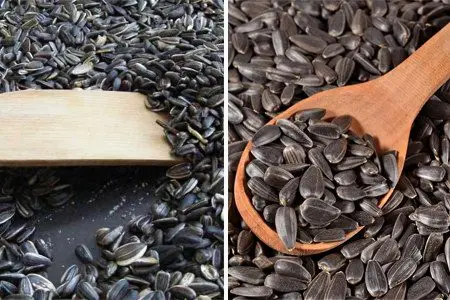
“It is not recommended to process seeds by roasting, as they contain vegetable oil, unsaturated fatty acids, trace elements, vitamin E. The fatty acids found in sunflower seeds quickly enter into an oxidative reaction. Exposure to high temperatures leads to the formation of carcinogenic compounds that adversely affect healthy cells in the human body. – says nutritionist Elena Solomatina.
In fried seeds, in comparison with raw ones, the loss of most of the useful components is recorded. They become just a source of empty calories.
It is important to properly store raw sunflower seeds. If certain conditions are not met, larvae can start in them.
In nutrition, a special place is occupied by germinated sunflower seeds. During germination, the concentration of nutrients in them increases significantly. The mechanisms that occur inside the seed contribute to the reduction of factors that negatively affect the absorption of minerals. For example, phytic acid is destroyed [2].
The benefits of sunflower seeds
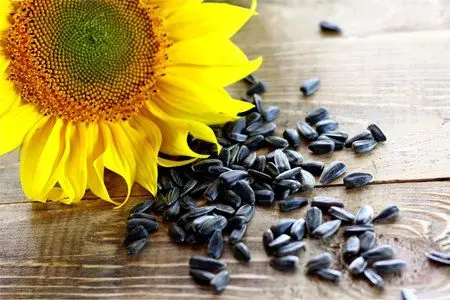
The high content of vitamin E, magnesium, linoleic fatty acids and protein explain the benefits of sunflower seeds and a number of its beneficial properties:
Reduce blood pressure.
Reduce cholesterol levels.
Lower blood sugar levels.
1 Relieve inflammation
Short-term inflammation is the physiological response of the body to the impact of a pathological agent. This is a normal immune response. However, the symptoms of chronic inflammation indicate the development of chronic diseases.
One study on sunflower seeds involved 6000 people. Those participants who ate sunflower seeds at least five times a week had a 32% decrease in C-reactive protein levels, compared to those who did not eat them. High levels of C-reactive protein are a marker of inflammatory processes associated with a high risk of cardiovascular disorders, the development of type II diabetes [3].
2 Reduce pressure
Sunflower seeds contain specific enzymes that narrow the lumen of blood vessels. Their action causes a decrease in the tone of the vascular wall and, as a result, a decrease in blood pressure. An additional factor that contributes to this process is the presence of magnesium.
Linoleic acid, which is concentrated in large quantities in sunflower kernels, contributes to a decrease in pressure. With its help, the body synthesizes substances that are similar in composition to hormones. They relax the membranes of large blood vessels, which lowers blood pressure. In addition, linoleic acid helps lower blood cholesterol levels. [4].
In another experiment that lasted three weeks, patients with type II diabetes received 30 grams of sunflower seeds. They were part of a balanced therapeutic diet. As a result, their blood pressure decreased by 5%. [5]. In addition, women showed a decrease in the level of “bad” cholesterol by 9%, and triglycerides – by 12%.
3 Protect against diabetes
The positive effect of sunflower seeds on blood glucose levels and the course of type II diabetes has been proven by several studies. The experiment showed that daily consumption of 30 grams of seeds as part of a complete diet lowers sugar levels. When taken on an empty stomach for 6 months, glucose levels are reduced by 10%, in contrast to the group following only a healthy diet [3]. The hypoglycemic effect is explained by the presence of chlorogenic acid in sunflower seeds.
4 Vitamin E
Sunflower kernels are rich in vitamin E. This component is known for its antioxidant properties. Several medical observations have proven the ability of vitamin E to maintain eye health. Its presence in the diet ensures the prevention of eye diseases, including macular degeneration.
Harm of sunflower seeds
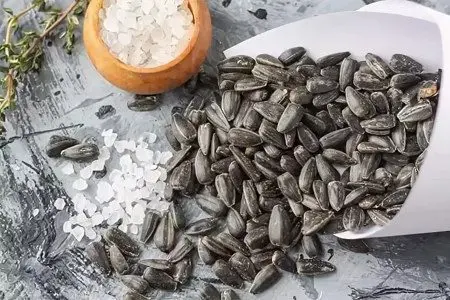
1 Excessive amount of salt
The shell of sunflower seeds is quite often treated with salt. The analysis revealed the presence of 8250 mg of sodium on the surface of the husk, which is in contact with the mucous membranes of the mouth. This huge amount of sodium corresponds to 356% of the recommended daily intake.
Information about the salt content on the label is usually not true. As a rule, the amount of sodium that is contained in the inner core, and not on the shell, is indicated.
2 The likelihood of constipation
One-time consumption of a large number of sunflower seeds can lead to significant stool retention. Constipation is equally common in adults and children. [6].
3 Presence of cadmium
Exposure to high doses of cadmium over a long period can adversely affect kidney health. Sunflower, more than other crops, is able to absorb cadmium from the soil. In a medical experiment, a group of participants were offered 255 grams of sunflower seeds per week for a year. Thus, the amount of cadmium in the body increased from 65 mcg to 175 mcg per week (WHO recommends a weekly cadmium limit of 490 micrograms). These changes did not affect the state of the renal structures. [7].
If your diet includes sunflower seeds in reasonable amounts, about 30 grams per day, then you should not worry about the level of cadmium in the body. It is important not to get carried away, absorbing the seeds without control.
Is it possible to get better from roasted seeds?
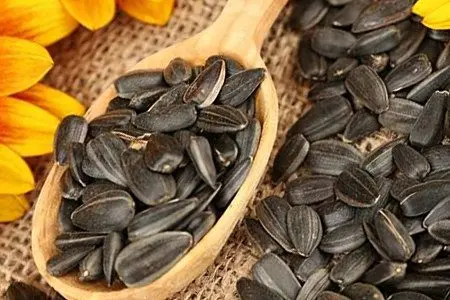
Any excesses in nutrition are dangerous for the appearance of extra pounds. If the number of seeds in the daily diet does not exceed 50 grams (300 kcal), then nothing threatens your waist. However, people uncontrollably gnawing seeds run the risk of getting better. Two glasses of sunflower seeds guarantees you 2500 kilocalories. This is a huge amount, given that women are recommended 2400-2500 kcal per day, and men – up to 3400 kcal.
The probability of increasing the size of the waist depends on the personal qualities of a person, his constitution and willpower. After all, it is not in vain that excessive husking of seeds is considered an addiction. If you are watching your figure and keeping track of calories consumed, know how to stop in time. Sunflower seeds from a good movie or a football match guarantee a bust of daily calories.
Can seeds help you lose weight?
Sunflower seeds contain a lot of fiber and natural proteins. They ensure the preservation of a healthy weight, stimulate the shedding of extra pounds. How it works? Fiber stimulates digestion, controls blood glucose levels. Protein helps keep you feeling full for a long time. This is important for those who want to lose weight.
Can dogs be given shelled seeds?

Dogs love shelled sunflower seeds. Delicacy to taste small and large breeds. Although Rottweilers and Caucasian Shepherd Dogs have seeds for one tooth, they constantly ask for more.
How much can you give?
It is very easy to overfeed an animal, and with regard to seeds, the norm is very important. If the animal is overfed with seeds, the dog will have problems digesting food. A single overfeeding can result in the usual indigestion. Undigested seeds usually come out of the intestines of the animal until everything eaten is completely gone.
Is it necessary to clean?
Before you treat dogs with seeds, you need to clean them. The pet cannot clean the nucleoli on its own, and the sunflower shell clogs the esophagus and intestines. Unpeeled seeds can get stuck between the dog’s teeth, damage the enamel, and cause gum problems.
White seeds – how are they different from black ones?
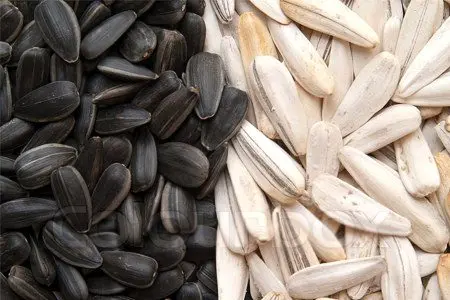
White seeds differ from black ones in larger sizes, oblong shape. They are easier to peel from the shells without smearing the fingers.
White seeds contain less fat. Their oiliness is about 35%, which is important for those who are on a diet. Proteins make up approximately 25%. They contain a maximum of valuable amino acids. In addition, seeds are rich in fatty acids, vitamins A, D, E, group B, magnesium, mineral elements. The taste of the kernels is distinguished by peculiar nutty notes.
How to roast seeds?
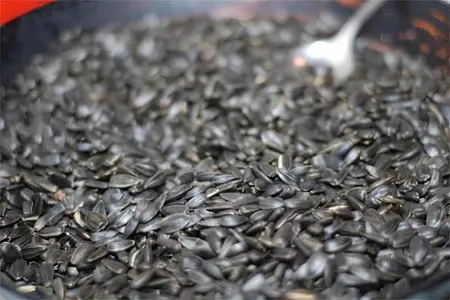
To get a tasty, healthy, rich product, it is important to follow certain rules:
Pre-sunflower seeds are thoroughly washed under running cold water.
Fry in a dry frying pan, which is preheated. It is best to use cast iron cookware.
It is best to fry immediately before use.
Can be dried in the oven or microwave.
During roasting, the seeds are stirred regularly. The process is continued until a specific crackling appears. The pan is removed from the heat, after a break, returned to the fire again. They do this several times. The seeds are constantly stirred so as not to burn. Overcooked kernels should not be eaten.
After roasting, the seeds are laid out on a wooden cutting board and covered with a towel. For taste, you can add a little salt during the frying process.
How to grow a sunflower from a seed?

For planting seeds, choose the southern part of the site, where the sun shines all day. It is important that the growing plant is protected from strong winds. The end of May is suitable for sowing. Wells are prepared up to a depth of 8 cm, spilled with water. Next, a seed is placed in each hole, sprinkled with earth and lightly clapped with the palm of your hand. It is allowed to sow 2-3 seeds in one hole.
During a drought, the seeds are watered for the first 14 days. After the sprouts have hatched, watering is not needed. Since that time, the sunflower provides itself with water. A powerful root system penetrates deep into the soil and receives all the necessary nutrients.
What to do with the husk?
If your family is fond of seeds in the evenings, and you do not know where to put the shells, you can try several ways:
As a garden mulch that prevents the growth of weeds around cultivated plants.
As a substitute for coffee and tea. The shells are fried in a pan or in the oven, ground in a coffee grinder or spice grinder. For brewing, take 1 tablespoon in a glass of hot water.
As feed for cows, sheep or poultry. On an industrial scale, sunflower husks are processed into special granules.
How to quickly clean 1 kg of seeds?
Of course, now in stores there is a large selection of peeled sunflower seeds. Few people know that the husk ensures the safety of nutrients. Roasted seeds are well cleaned.
[Video] How to quickly clean 1 kg of seeds?









